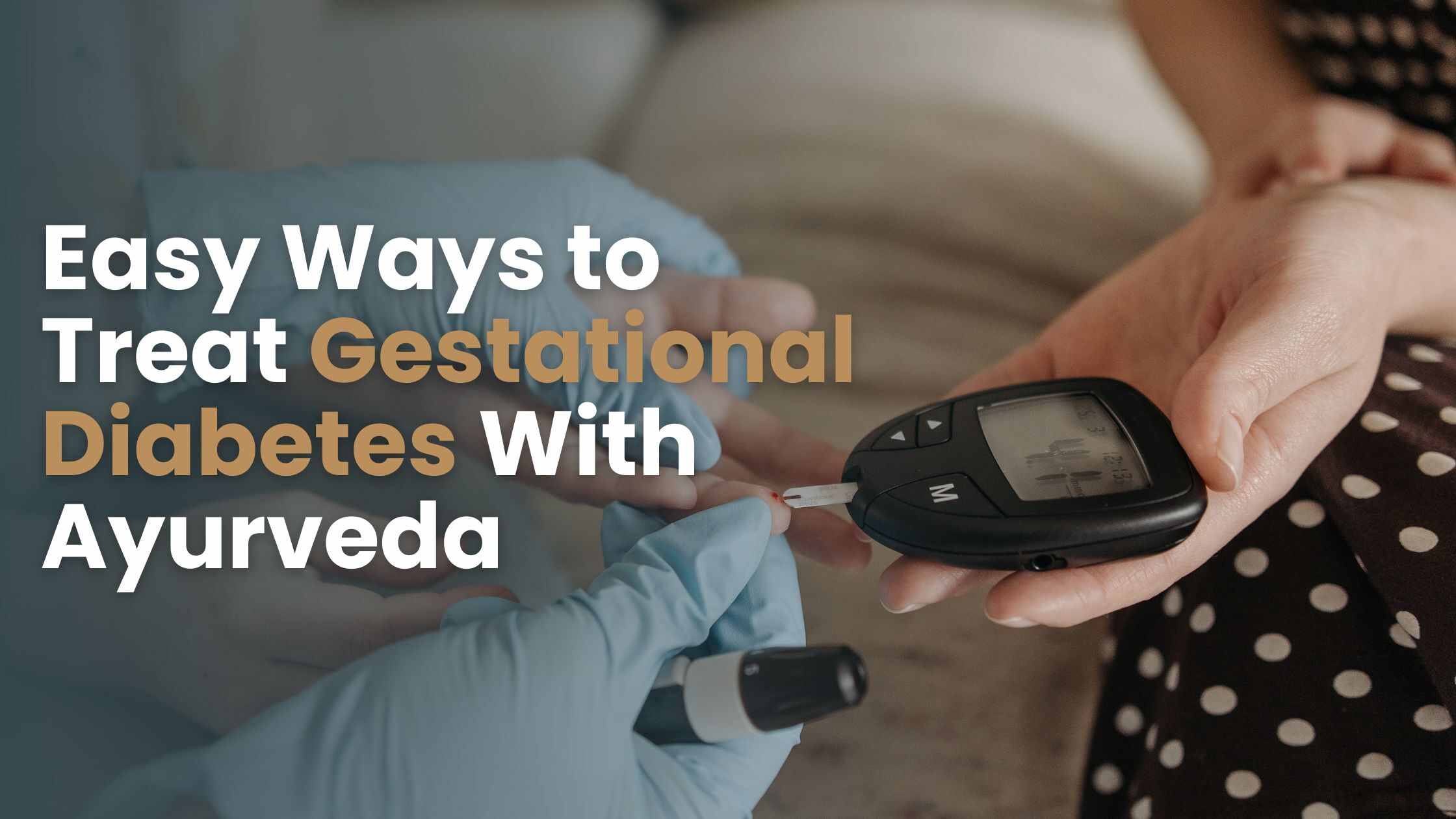Gestational diabetes is a condition that affects some women during pregnancy. It occurs when the body cannot make enough insulin, leading to high blood sugar levels. Managing this condition is crucial for both the mother and baby. Ayurveda, a traditional Indian practice, offers natural and gentle ways to help control gestational diabetes.
With a focus on diet, lifestyle changes, and herbal remedies, Ayurveda provides a holistic approach to maintaining healthy blood sugar levels during pregnancy. In this blog, we’ll explore simple Ayurvedic tips to help manage gestational diabetes, along with understanding the condition, its causes, risks, and preventive measures.
What is Gestational Diabetes?
Gestational diabetes is a type of diabetes that develops during pregnancy. It usually appears in the second trimester and can affect any woman, even those without a history of diabetes. This condition happens when the body struggles to produce enough insulin, a hormone that regulates blood sugar levels. Without enough insulin, glucose builds up in the blood, leading to higher-than-normal blood sugar levels.
To manage gestational diabetes, it is crucial to monitor blood sugar levels regularly and follow a balanced diet. Some women explore Ayurvedic medicine for diabetes as a complementary approach, using natural remedies to help manage their condition.
While gestational diabetes typically goes away after childbirth, it requires careful management during pregnancy to ensure a healthy outcome for both the mother and the baby.
Reasons for Gestational Diabetes
Gestational diabetes can develop for several reasons. Some of the main factors include:
1. Hormonal Changes: During pregnancy, the placenta produces hormones that can interfere with insulin function, making it harder for the body to control blood sugar levels.
2. Insulin Resistance: As the pregnancy progresses, the body may become more resistant to insulin. This means the cells do not respond as effectively to insulin, causing blood sugar levels to rise.
3. Genetic Factors: A family history of diabetes can increase the risk of developing gestational diabetes. If a close relative has diabetes, it may run in the family.
4. Obesity: Being overweight before pregnancy can contribute to insulin resistance, making it more likely to develop gestational diabetes.
5. Unhealthy Diet: Consuming high amounts of sugary and processed foods can lead to excessive weight gain and may contribute to the development of gestational diabetes.
6. Physical Inactivity: A lack of regular physical activity can make it difficult for the body to regulate blood sugar levels effectively, increasing the risk of gestational diabetes.
7. Age: Women over the age of 25 are at a higher risk of developing gestational diabetes.
Understanding these factors can help in taking preventive measures and managing the condition effectively.
Risks Associated with Gestational Diabetes
Gestational diabetes can pose several risks to both the mother and the baby if not managed properly. Some of the potential risks include:
1. High Birth Weight: Babies born to mothers with gestational diabetes may have a higher birth weight, increasing the chances of delivery complications.
2. Preterm Birth: The condition may lead to early labor and delivery, which can result in various health issues for the baby.
3. Low Blood Sugar in Baby: Newborns of mothers with gestational diabetes may experience low blood sugar levels shortly after birth, requiring medical intervention.
4. Increased Risk of Type 2 Diabetes: Both the mother and the child have a higher risk of developing type 2 diabetes later in life.
5. High Blood Pressure: Gestational diabetes can contribute to high blood pressure during pregnancy, leading to potential complications.
6. Cesarean Delivery: The likelihood of requiring a cesarean delivery may increase due to the complications associated with gestational diabetes.
It is essential to monitor and manage gestational diabetes to reduce these risks and ensure a healthy pregnancy and delivery.
Prevention
Preventing gestational diabetes involves taking proactive steps to maintain healthy blood sugar levels. Here are some simple ways to help prevent the condition:
Tests
· Regular Screening: Get tested for blood sugar levels during the early stages of pregnancy to identify any signs of gestational diabetes.
· Glucose Tolerance Test: This test is usually conducted between the 24th and 28th weeks of pregnancy to check how your body processes glucose.
Recipes and Diet
· Balanced Diet: Incorporate whole grains, fruits, and vegetables into your diet. Focus on foods with a low glycemic index to keep blood sugar levels stable.
· Portion Control: Eat smaller, more frequent meals to avoid spikes in blood sugar levels.
· Hydration: Drink plenty of water to help regulate blood sugar levels and support overall health.
· Limit Sugary Foods: Avoid foods high in sugar and refined carbohydrates. Opt for natural sweeteners and complex carbs instead.
· Include Ayurvedic Herbs: Certain herbs like fenugreek, turmeric, and bitter melon are known in Ayurveda for their blood sugar-regulating properties. Consult with a healthcare provider before incorporating these into your diet.
Conclusion
Gestational diabetes is a manageable condition with the right approach. By understanding the causes, risks, and preventive measures, you can take control of your health during pregnancy. Ayurveda offers a natural way to manage gestational diabetes through dietary adjustments, lifestyle changes, and the use of Ayurvedic medicine for diabetes. With proper care and attention, you can ensure a healthy pregnancy and a safe delivery for both you and your baby.
FAQs
1. Can gestational diabetes go away after pregnancy?
Yes, gestational diabetes typically goes away after childbirth. However, it’s essential to monitor your blood sugar levels post-pregnancy.
2. Is it safe to use Ayurvedic medicine for diabetes during pregnancy?
Ayurvedic medicine can be beneficial but always consult with your healthcare provider before starting any new treatment during pregnancy.
3. What foods should I avoid if I have gestational diabetes?
Avoid sugary foods, refined carbs, and processed snacks. Focus on whole grains, fresh vegetables, and lean proteins.
4. Can exercise help in managing gestational diabetes?
Yes, regular physical activity can help regulate blood sugar levels and is an important part of managing gestational diabetes. Always consult your doctor before starting any exercise regimen during pregnancy.




